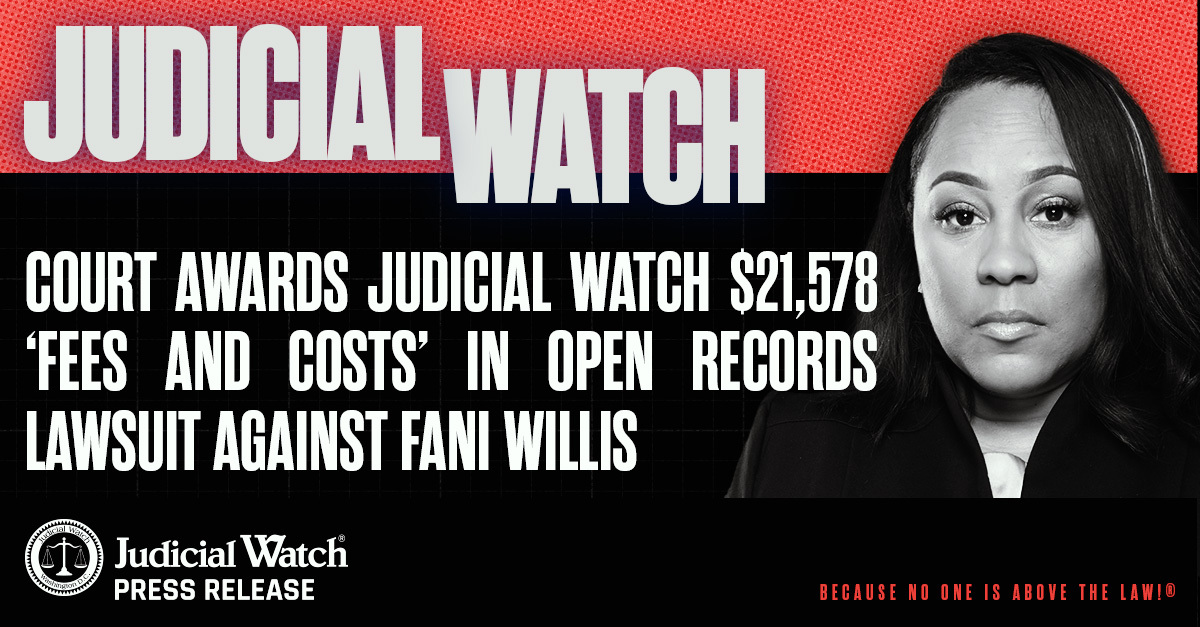

Judicial Watch Statement on Supreme Court Ruling Requiring Fourth Circuit to Follow Three-Judge Court Act in Maryland Gerrymandering Challenges
(Washington, DC) – Judicial Watch announced today a unanimous, 9-0 U.S. Supreme Court ruling that overrules the U.S. Court of Appeals for the Fourth Circuit and affirms the Three-Judge Court Act, a law requiring three federal judges to be empaneled to try federal lawsuits concerning redistricting, voting rights, and other key constitutional issues (Shapiro et al. v. McManus, Chairman, Maryland State Board of Elections, et al. (No. 14-990)).
Judicial Watch President Tom Fitton made the following statement:
“Today’s unanimous decision in favor of requiring the Fourth Circuit to follow the Three-Judge Court Act shows that even judges are not above the law,” said Judicial Watch President Tom Fitton. “Judicial Watch was the sole amicus party to advocate for certiorari in this case. Today’s victory is especially gratifying because it should ensure our clients’ separate redistricting lawsuit in Maryland will have a faster path for relief, perhaps in time for the 2016 elections.”
Key portions of the ruling are as follows:
[T]he District Judge dismissed petitioners’ complaint not because he thought he lacked jurisdiction, but because he concluded that the allegations failed to state a claim for relief on the merits, citing Ashcroft v. Iqbal … and Bell Atlantic Corp. v. Twombly … We think this standard both too demanding and inconsistent with our precedents.
***
Without expressing any view on the merits of petitioners’ claim, we believe it easily clears Goosby’s low bar; after all, the amended complaint specifically challenges Maryland’s apportionment “along the lines suggested by Justice Kennedy in his concurrence in Vieth v. Jubelirer, 541 U. S. 267 (2004).
In contravention of the Three-Judge Court Act, the U.S. Court of Appeals for the Fourth Circuit had allowed a single judge to rule on a critical Maryland gerrymandering case (Stephen M. Shapiro, et al., v. David J. McManus, Jr., Chairman, Maryland State Board of Elections, et al. (No. 14-990)). Judicial Watch filed an amicus brief in this case on March 20, 2015, and a second amicus brief on August 14, 2015.
The Three-Judge Court Act requires that three-judge panels must hear all constitutional challenges to legislative redistricting unless a case is “obviously frivolous,” “essentially fictitious,” “wholly insubstantial,” or “obviously without merit.”
Judicial Watch represents several Maryland voters in a lawsuit challenging the constitutionality of Maryland’s gerrymandered congressional district maps. Judicial Watch’s most recent amicus brief argues that:
[T]he Fourth Circuit’s ruling violates the Three-Judge Court Act and will allow states to delay judicial review of gerrymandered redistricting plans that disenfranchise voters and violate the Constitution. Moreover, on June 24, 2015, Judicial Watch filed a new constitutional challenge to Maryland’s redistricting plan on behalf of several plaintiffs. See Parrott v. Lamone, No. 1:15-cv-01849 (D. Md.). The plaintiffs have asked for a three-judge panel in Parrott, but no such panel has been convened yet, and a motion to dismiss is currently pending before the single judge initially assigned to the case.
Judicial Watch worked with attorneys Meir Feder and Rajeev Muttreja of the Jones Day law firm, who prepared and filed the amicus briefs on Judicial Watch’s behalf.
Judicial Watch first entered the Maryland redistricting battle on August 10, 2012, when it represented MDPetitions.com and Delegate Neil Parrott in its successful lawsuit to block a move by the state’s Democrat party to have an Election Day voter referendum on the state’s controversial gerrymandering plan removed from the ballot. Three weeks later, Judicial Watch again represented Delegate Parrott in filing a complaint against Maryland Secretary of State John McDonough and the State Board of Elections challenging the misleading language of the wording of the ballot question. The current constitutional challenge to the Maryland gerrymander is pending in federal court (Parrott, et al, v. Lamone, et al (No. 1:15-cv-01849).
###















